新东方新概念英语课件第三册Lesson 56 Our neighbour,the river
- 格式:ppt
- 大小:1.35 MB
- 文档页数:9
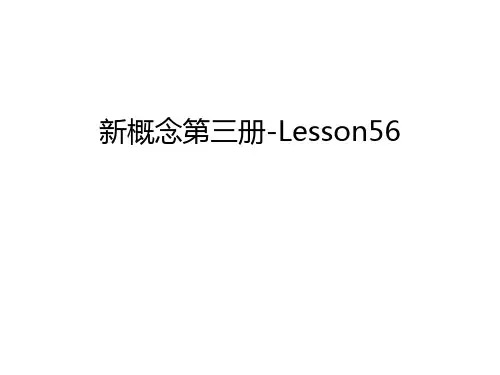
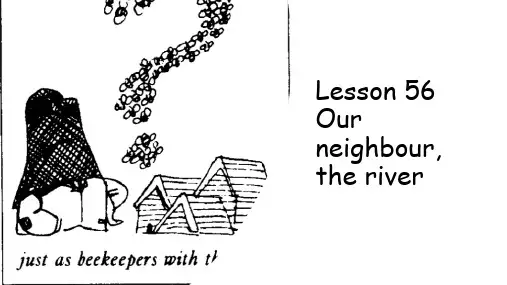
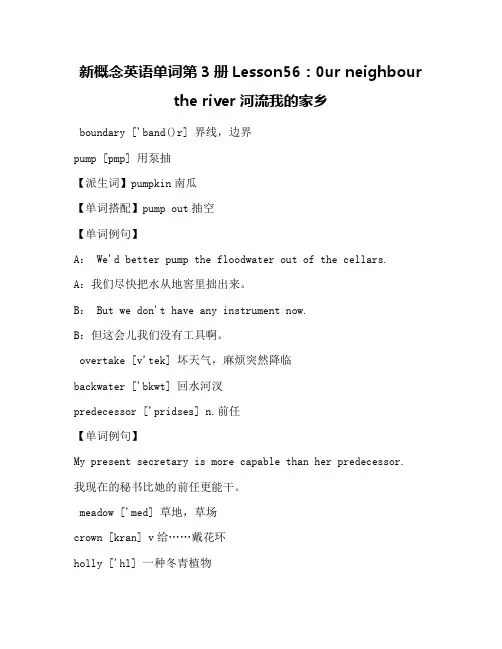
新概念英语单词第3册Lesson56:0ur neighbourthe river河流我的家乡boundary ['band()r] 界线,边界pump [pmp] 用泵抽【派生词】pumpkin南瓜【单词搭配】pump out抽空【单词例句】A: We'd better pump the floodwater out of the cellars.A:我们尽快把水从地窖里拙出来。
B: But we don't have any instrument now.B:但这会儿我们没有工具啊。
overtake [v'tek] 坏天气,麻烦突然降临backwater ['bkwt] 回水河汊predecessor ['pridses] n.前任【单词例句】My present secretary is more capable than her predecessor.我现在的秘书比她的前任更能干。
meadow ['med] 草地,草场crown [kran] v给……戴花环holly ['hl] 一种冬青植物wreath [riθ] 花环【单词扩充】garland花环【单词例句】A:I ordered a wreath from the flonst.A:我从花店定购了一个花环。
B: Who do you want to send it to?B:你想送给谁啊?occurrence ['kr()ns] 偶发事件proportion[pr'p()n] 部分【派生词】proportional成比例的【单词扩充】part部分 section部分【单词搭配】out of proportion to 与……不成比例【单词例句】A large proportion of the streets were sewered.绝大部分街道都铺有下水道。
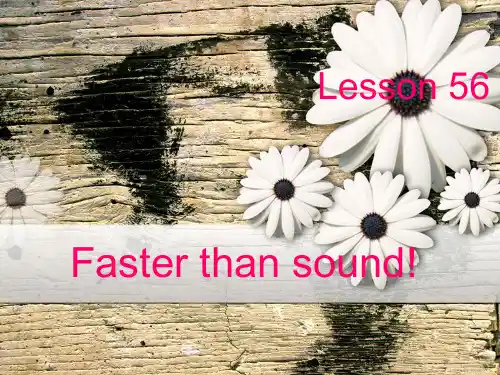
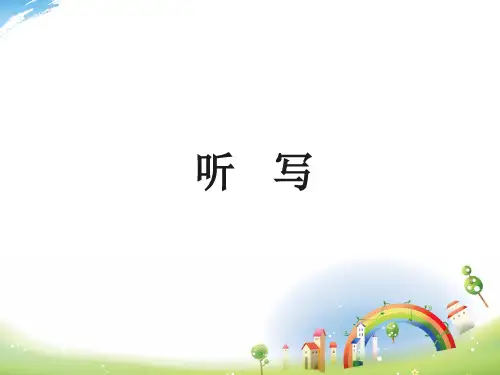
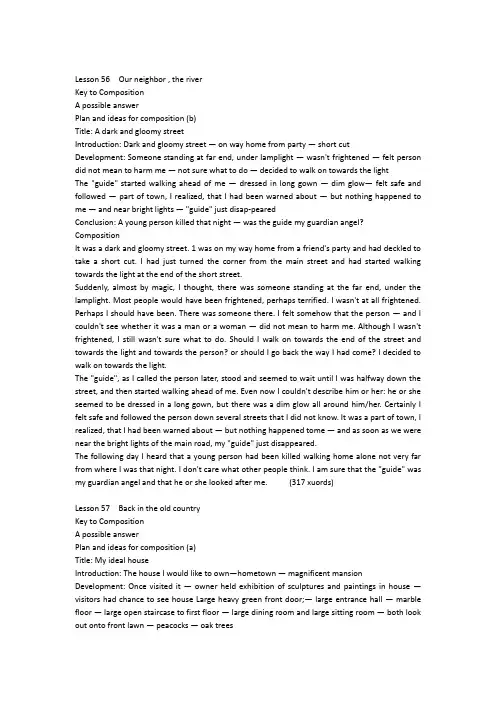
Lesson 56 Our neighbor , the riverKey to CompositionA possible answerPlan and ideas for composition (b)Title: A dark and gloomy streetIntroduction: Dark and gloomy street — on way home from party — short cut Development: Someone standing at far end, under lamplight — wasn't frightened — felt person did not mean to harm me — not sure what to do — decided to walk on towards the lightThe "guide" started walking ahead of me — dressed in long gown — dim glow— felt safe and followed — part of town, I realized, that I had been warned about — but nothing happened to me — and near bright lights — "guide" just disap-pearedConclusion: A young person killed that night — was the guide my guardian angel? CompositionIt was a dark and gloomy street. 1 was on my way home from a friend's party and had deckled to take a short cut. I had just turned the corner from the main street and had started walking towards the light at the end of the short street.Suddenly, almost by magic, I thought, there was someone standing at the far end, under the lamplight. Most people would have been frightened, perhaps terrified. I wasn't at all frightened. Perhaps I should have been. There was someone there. I felt somehow that the person — and I couldn't see whether it was a man or a woman — did not mean to harm me. Although I wasn't frightened, I still wasn't sure what to do. Should I walk on towards the end of the street and towards the light and towards the person? or should I go back the way I had come? I decided to walk on towards the light.The "guide", as I called the person later, stood and seemed to wait until I was halfway down the street, and then started walking ahead of me. Even now I couldn't describe him or her: he or she seemed to be dressed in a long gown, but there was a dim glow all around him/her. Certainly I felt safe and followed the person down several streets that I did not know. It was a part of town, I realized, that I had been warned about — but nothing happened tome — and as soon as we were near the bright lights of the main road, my "guide" just disappeared.The following day I heard that a young person had been killed walking home alone not very far from where I was that night. I don't care what other people think. I am sure that the "guide" was my guardian angel and that he or she looked after me. (317 xuords)Lesson 57 Back in the old countryKey to CompositionA possible answerPlan and ideas for composition (a)Title: My ideal houseIntroduction: The house I would like to own—hometown — magnificent mansion Development: Once visited it — owner held exhibition of sculptures and paintings in house —visitors had chance to see house Large heavy green front door;— large entrance hall — marble floor — large open staircase to first floor — large dining room and large sitting room — both look out onto front lawn — peacocks — oak treesBack of house -—kitchen, a laundry room, games room —upstairs 6 bedrooms, 4 bathrooms House — full of antique fur-niture — rooms decorated classical styleConclusion: May sound like a dream — will be realityCompositionThere is a house in another part of my home town that I would love to own. It is called the "White House", like the President's house in Washington! I think you could easily describe it as a "mansion" and it is magnificent. I have no idea how much it is worth, but that doesn't worry me. I admire the house and have always admired it.I do not have to imagine what the house is like inside because I have, strange as it may seem, actually been inside. About three years ago the owner held an exhibition of sculptures and paintings in the house. The exhibits were distributed throughtout the house so that allthe visitors had a chance to see the house.When you go in through the large heavy green front door, you find yourself in a large entrance hall with a shining black and white marble floor, rooms leading off from it in all directions, and a large open staircase leading up to the first floor. There is a large dining roomon the right and a large sitting room on the left. Both rooms have big windows that look out onto the front lawn. There are always pea-cocks on the front lawn, and there are two large oak trees where you can sit in the shade on hot summer days.At the back of the house is a large kitchen, a laundry and work room and a games room. Upstairs there are six bedrooms and fourbathrooms. I think there are four bathrooms, but I can't quite remember.The house is full of beautiful antique furniture and all the rooms are decorated in a classical style — lots of light blue and light green paint with white doors, and quite a lot of gold decoration. ?. The whole thing may sound like a dream, but one day it will be reality. One day I will own my ideal house. (332 words)Lesson 58 A spot of botherKey to CompositionA possible answerPlan and ideas far composition (b)Title: My first visit to the UKIntroduction: Nothing like first visit abroad —what to expect? —new language, new culture —everything new and strange.Development: 3 years ago — UK — arrival at airport — experiencesLanded at Heathrow — met by rep of Al English Language School — taken to accommodation —j small English family — at first everything strange — after 3-4 days began to enjoy staySo many things to learn in England — example — asking way to "Albert Hall" - "the Albert Hall" Conclusion: Foreign travel — impossible to overestimate value — also helps understand foreign visitors to our countryComposition'There is nothing like your first visit to a foreign country. Whatever you may have heard, or whatever you have read or seen, you still don’t really know what to expect. You will hear and read a new language, you will be surrounded by a completely different culture, and everything will seem new and strange.My first visit abroad was three years ago when I went to the UK. I had booked to attend a short English language course in London with a friend of mine. After a very long flight, we landed at Heathrow Airport and were met by a representative of the Al English Lan-guage School. She welcomed us and took us to accommodation. We were staying with a small English family. At first everything was so strange—the food, the furniture in their home and the way they live, everything! But after three or four days we both began to enjoy our stay, and of course, we made lots of friends at the school, which was only half a mile away.There are so many things to learn when you are in England. For example, one day my friend and I were sightseeing in London and stopped to ask en Englishman the way."Excuse me, " I said. "Where is Albert Hall?" I thought my English was just right.'Oh, " he said, "you mean the Albert Hall!" "Yes, " I said, "where is the Albert Hall?"He then explained how to get to the Albert Hall, but I didn't realize the word "the" was so important in English! It is impossible to overestimate what you get from foreign travel. Going to the UK made me realize how small the world is, at i me see how important travel is, and it helped me to understand what foreign visitors feel like when they visit China for the first time.(317 words]Lesson 59 CollectingKey to CompositionA possible answerPlan and ideas for composition (b)Title: The knock on the windowIntroduction: There was a knock on the window — hardly noticeable—branch on oak tree? Development: House stands on own — countryside — lonely — few neighbours — don't see each other Heard blowing of wind — noise of traffic from main roadConclusion: Looked oat — no one there — came back in — knock on window—louder — heart pounding—lane . . .CompanionThere was a knock on the window. At first it was hardly noticeable, almost as if a branch on the large oak tree outs,against the window. It was repeated, and then there was silence. , I got up and looked out of the window. I couldn't see anybody and my dog hadn't started barking. It was mid-afternoon, atx o'clock and I had been listening to the radio and reading a book. The house stands on its own, down the end of a long lane in the 1. at the countryside, so it is very lonely. I have few neighbours, but the neighbours I have are very good, even though we don't see other very often.I had got so nervous recently that I had to summon up enough courage to unlock the front door and go outside. There was no one there. True, there was e light breeze and the wind was shaking the branches of the oak tree, but me only other sound was the noise of the traffic on the mainroad a mile away. For one moment I thought I saw someone hiding behind the fence, but nothing moved, so I thought I must be wrong.I came back in and settled down by the fire with my book. Then there was a knock on the window, this time louder. It was a real knock with a human hand, no doubt about it—well, certainly not the branch of a tree— and my heart started pounding. I looked up andthere, outside the window, was the little girl from down the lane. Her mother had sent her down to see if I was all right, and she had decided to play a trick on me. (292 words)Lesson 60 Too early and too lateKey to CompositionA possible answerPlan and ideas for composition(c)Title: A piece of paperIntroduction: Piece of paper — blowing in wind — not large i— drop into water? — looked very light — tissue / toilet paper?Development: Finished sandwiches — set off back to office — not looking forward to-afternoon.Piece of paper flew up again — noticed writing on it — flew away — dropped down — wind took it againRan after it once more — landed in front of meConclusion: Lottery ticket — took it home — won ?50!CompositionA piece of paper was blowing in the wind. When I saw it, I was sitting in the park eating my sandwiches. It was floating across the surface of the park lake, not large, about half the size of a postcard, and I wondered when it would drop into the water. But it didn't. As it got near to the surface, it rose again and the wind took it over the bank towards some trees. Even then I thought that it looked very light —perhaps tissue paper or toilet paper, maybe —because it almost fluttered, like a butterfly. But then again, perhaps it wasn't Perhaps it was just ordinary paper that had got a bit wet.I finished my sandwiches, threw my waste paper into the bin nearby and set off back towards the trees and my office. I was not look-ing forward to the afternoon. As I walked round the edge of the lake, the piece of paper flew up again in front of me. It began to anno] me, and intrigue me —because when it flew up, I noticed that it was pink with some writing on it- It flew away and I chased it. I dropped down and I had nearly reached it when the wind took it again. I ran after it once more and it landed again some metres in front of me.I finally caught up with it and put my foot on it to stop it flying away again. This time I held it firmly with my foot until I could lean down and pick it up. I looked at it and realized what it was: a lottery ticket — 8 little wet, and one comer was torn, but it was a lottery ticket. I could see that the date on it was about six weeks before. It was probably worth nothing, but I decided to take it home and dry it.It was worth something! When I checked the numbers with the winning numbers six weeks before, I had four the same. The "piece of paper" was worth ? 50! (334 words)。
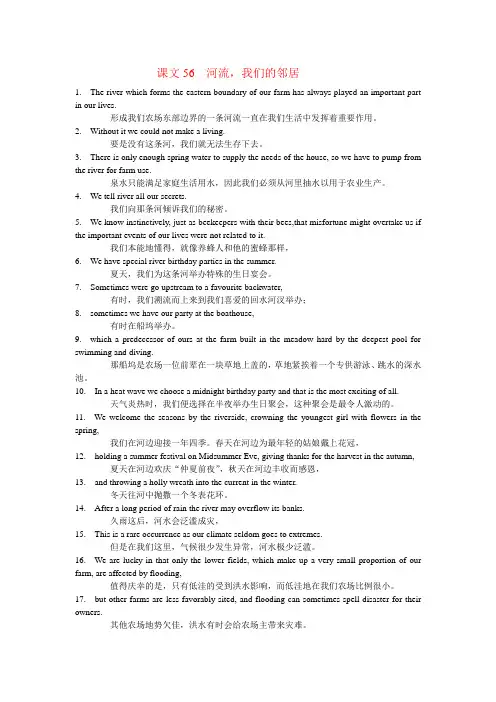
课文56 河流,我们的邻居1. The river which forms the eastern boundary of our farm has always played an important part in our lives.形成我们农场东部边界的一条河流一直在我们生活中发挥着重要作用。
2. Without it we could not make a living.要是没有这条河,我们就无法生存下去。
3. There is only enough spring water to supply the needs of the house, so we have to pump from the river for farm use.泉水只能满足家庭生活用水,因此我们必须从河里抽水以用于农业生产。
4. We tell river all our secrets.我们向那条河倾诉我们的秘密。
5. We know instinctively, just as beekeepers with their bees,that misfortune might overtake us if the important events of our lives were not related to it.我们本能地懂得,就像养蜂人和他的蜜蜂那样,6. We have special river birthday parties in the summer.夏天,我们为这条河举办特殊的生日宴会。
7. Sometimes were go upstream to a favourite backwater,有时,我们溯流而上来到我们喜爱的回水河汊举办;8. sometimes we have our party at the boathouse,有时在船坞举办。
9. which a predecessor of ours at the farm built in the meadow hard by the deepest pool for swimming and diving.那船坞是农场一位前辈在一块草地上盖的,草地紧挨着一个专供游泳、跳水的深水池。
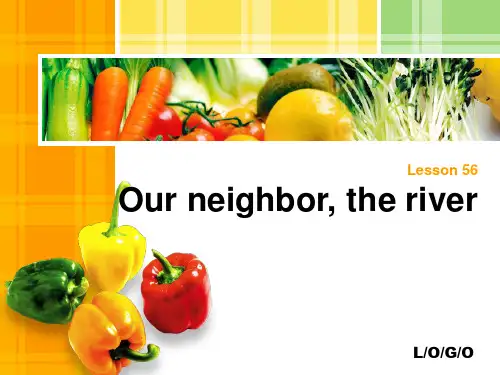
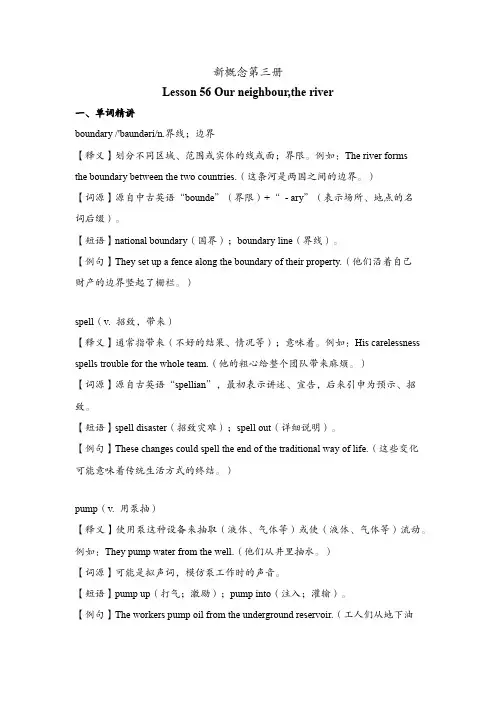
新概念第三册Lesson 56 Our neighbour,the river一、单词精讲boundary /'baundəri/n.界线;边界【释义】划分不同区域、范围或实体的线或面;界限。
例如:The river formsthe boundary between the two countries.(这条河是两国之间的边界。
)【词源】源自中古英语“bounde”(界限)+“- ary”(表示场所、地点的名词后缀)。
【短语】national boundary(国界);boundary line(界线)。
【例句】They set up a fence along the boundary of their property.(他们沿着自己财产的边界竖起了栅栏。
)spell(v. 招致,带来)【释义】通常指带来(不好的结果、情况等);意味着。
例如:His carelessness spells trouble for the whole team.(他的粗心给整个团队带来麻烦。
)【词源】源自古英语“spellian”,最初表示讲述、宣告,后来引申为预示、招致。
【短语】spell disaster(招致灾难);spell out(详细说明)。
【例句】These changes could spell the end of the traditional way of life.(这些变化可能意味着传统生活方式的终结。
)pump(v. 用泵抽)【释义】使用泵这种设备来抽取(液体、气体等)或使(液体、气体等)流动。
例如:They pump water from the well.(他们从井里抽水。
)【词源】可能是拟声词,模仿泵工作时的声音。
【短语】pump up(打气;激励);pump into(注入;灌输)。
【例句】The workers pump oil from the underground reservoir.(工人们从地下油库抽油。
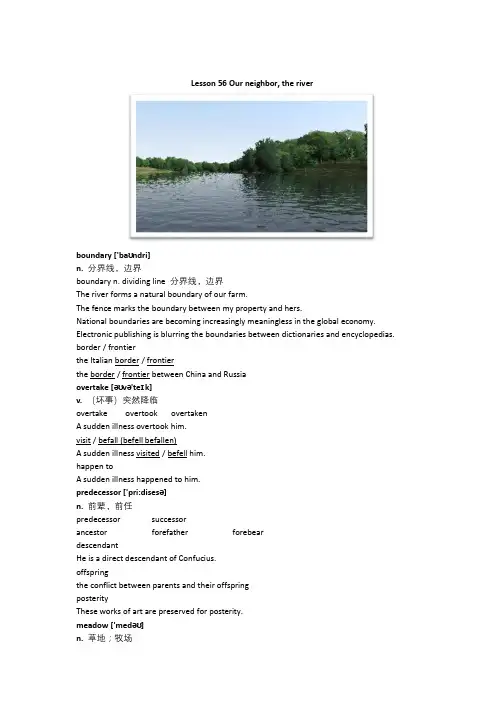
Lesson 56 Our neighbor, the riverboundary ['baʊndri]n. 分界线,边界boundary n. dividing line 分界线,边界The river forms a natural boundary of our farm.The fence marks the boundary between my property and hers.National boundaries are becoming increasingly meaningless in the global economy. Electronic publishing is blurring the boundaries between dictionaries and encyclopedias. border / frontierthe Italian border / frontierthe border / frontier between China and Russiaovertake [əʊvə'teɪk]v. (坏事)突然降临overtake overtook overtakenA sudden illness overtook him.visit / befall (befell befallen)A sudden illness visited / befell him.happen toA sudden illness happened to him.predecessor ['pri:disesə]n. 前辈,前任predecessor successorancestor forefather forebeardescendantHe is a direct descendant of Confucius.offspringthe conflict between parents and their offspringposterityThese works of art are preserved for posterity.meadow ['medəʊ]n. 草地;牧场meadow awnpasture prairiesavanna(h) grasslandthe Inner Mongolian Grasslandoccurrence [ə'kʌrəns]n. 事情,事件occurrence occurhappening happentrifle incidenta border incidenta shooting incidentaffaircurrent affairsChina’s internal affairslove affairseventaccident / contingencycoincidenceproportion [prə'pɔ:ʃn]n. 比例the proportion of sth. to sth.What's the proportion of boys to girls in your class?in proportion to sth.Payment will be in proportion to the work done, not to the time spent doing it. out of (all) proportion to sth.They earn salaries out of all proportion to their ability.a high / large proportion of …a small / tiny proportion of …a high / large percentage of ...a small / tiny percentage of ...a / the majority of ...a / the minority of ...site [saɪt]v. 使位于site locate situateThe house is sited / located / situated on the hill.site location situationjuncture ['dʒʌŋktʃə(r)]n. 时刻,关头At this juncture it’s too late to say anything.The battle had reached a critical / crucial juncture.time momentpoint instantunduly [ʌn'dju:li]adv. 过分地,过度地unduly = excessively adv. 过分地,过度地The levels of pollution in this area are unduly high.He did not sound unduly worried at the prospect.undue = excessive adj. 过分的,过度的The work should be carried out without undue delay.We did not want to put any undue pressure on them.due adj. proper, suitable 适当的After due consideration, we have decided to appoint Mr. Davis to the job.submerge [səb'mɜ:dʒ]v. 淹没,潜入水中submerge submarinedive diver / frogmanplunge into ...go down / go under / go to the bottomThe tragic sinking of this great liner will always be remembered, for she went down on her first voyage with heavy loss of life.man’s best friend, the dogGod Almighty, Jesus ChristThe river which forms the eastern boundary of our farm has always played an important part in our lives.play a … role / part in …发挥某种作用造句:西安市在中国历史上有至关重要的作用。
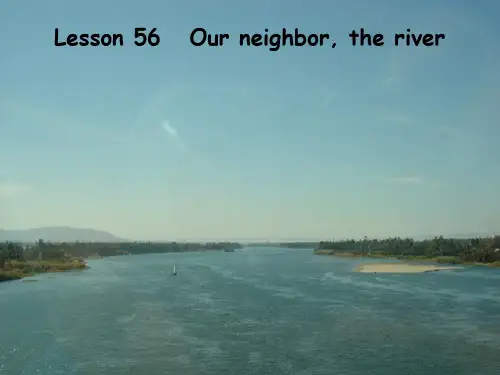
新概念英语三语法填空练习Lesson 56 The river, our neighborThe river which forms the eastern boundary of our farm has always played an important part in our lives. Without it we could not make a living. There is only enough spring water to supply the needs of the house,_______(1)_________we have to pump from the river for farm use. We tell the river all our secrets. We know _______(2)_________(instinctive), just as beekeepers with their bees, that misfortune might overtake us ______(3)________ the important events of our lives were not related to it.We have special river birthday parties in the summer. Sometimes we go up-stream to a favourite backwater, sometimes we have our party at the boathouse, _____(4)_____ a predecessor of ours at the farm built in the meadow hard by the ______(5)_______(deep) pool for swimming and diving. In a heat-wave we choose a midnight birthday party and that is the most exciting of all. We welcome the seasons by the river-side, crowning the youngest girl with flowers in the spring,holding a summer festival on Midsummer Eve,______(6)_____( give) thanks for the harvest in the autumn, and throwing a holly wreath into the current in the winter.After a long period of rain the river may overflow its banks. This is a rare occurrence as our climate seldom god to extremes. We are lucky in that only the lower fields, which make up a very small proportion of our farm,______(7)______ (affect) by flooding, but other farms are less_______(8)______ (favorable) sited, and flooding can sometimes spell disaster for their owners.One bad winter we watched the river creep up the lower meadows. All the cattle had been moved into stalls and we stood to lose little. We were, ______(9)______, worried about our nearest neighbors, _______(10)______ farm was low lying and ____(11)______were newcomers to the district. As the floods had put the telephone out of order, we could not find out how they were managing. From an attic window we could get a sweeping view of the river ______(12)______their land joined ours, and at the most critical juncture we took turns in watching that point. The first sign of disaster was a dead sheep ______(13)_____(float) down. Next came a horse, swimming bravely, but we were afraid that the strength of the current would prevent its landing anywhere _____(14)______ it became exhausted. Suddenly a raft appeared, looking rather like Noah's ark, ______(15)_____(carry) the whole family, a few hens, the dogs, a cat, and a bird in a cage. We realized that they must have become unduly ______(16)_____(frighten) by the rising flood, for their house, ______(17)______ had sound foundations, would have stood stoutly even if it______(18)______(be) almost submerged. The men of our family waded down _______(19)_______ our flooded meadows with boathooks, _______(20)_______ the hope of being able to grapple a corner of the raft and pull it out of the current towards our bank. We still think it a miracle that they were able to do so.Answer: (1)so (2)instinctively (3)if (4)which (5) deepest(6)giving (7)are affected (8) favorably (9) however (10)whose(11)who (12)where (13)floating (14)before (15) carrying(16)frightened (17)which (18)had been (19)through (20) in。